Trump leads Republican ‘bandwagon’ against Syrian refugees
- Published
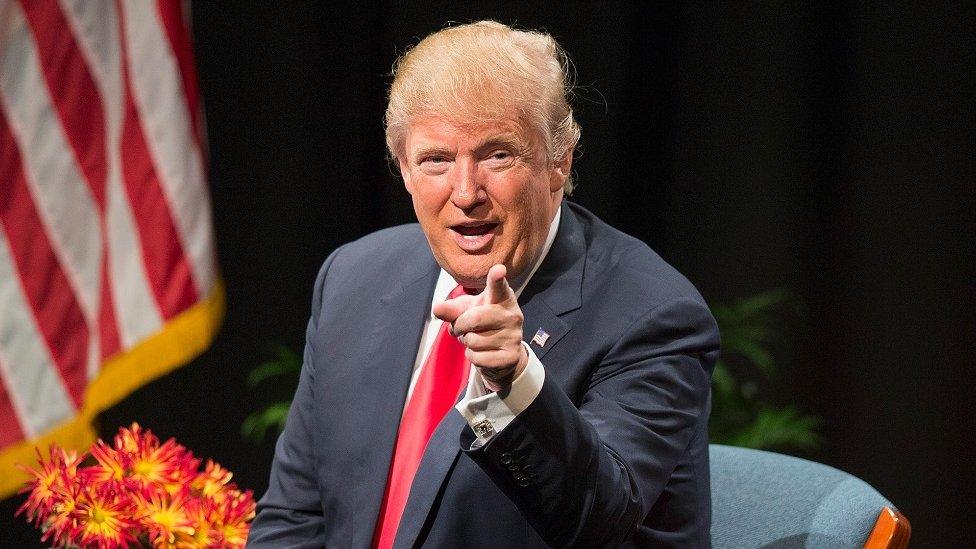
Billionaire Donald Trump continues to dominate the polls and drive the debate in the Republican presidential nomination, staying a step ahead of his competitors on the issues of immigration, border security and the Syrian refugee crisis.
Some speculated that the Paris attacks would change that. In fact, it has only made it more obviously true. And, in case anyone forgets, Mr Trump is happy to remind them.
"Everyone is now saying how right I was with illegal immigration and the wall," he tweeted, external on Thursday. "After Paris, they're all on the bandwagon."
Mr Trump cites the opening speech of his campaign, where he warned that Mexico was sending its "criminals and rapists" to the US, as a defining moment in the Republican presidential race.
"I was tougher when it wasn't very politically popular to be tough," he said last week. "And I took a lot of heat."
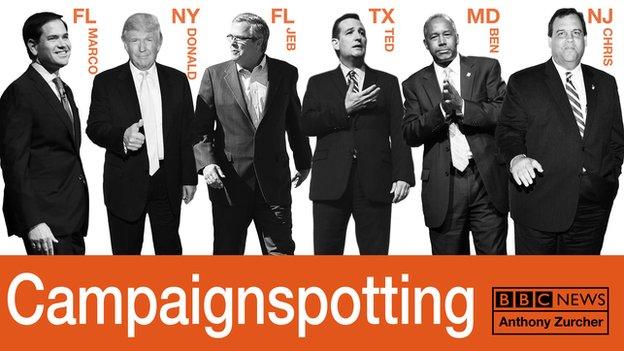
That campaign kick-off started Mr Trump's steady rise to the top of the Republican presidential pack among Republican voters nationally and in key early-voting states like Iowa and New Hampshire.
By the time the Republican presidential debates arrived, nearly every candidate was echoing Mr Trump's calls for increased border security and denouncing anything remotely close to an "amnesty" that would give undocumented immigrants in the US a way to eventually earn citizenship.
New Jersey Governor Chris Christie said visitors to the US should be monitored, external the same way shipping companies like Federal Express track packages.
Texas Senator Ted Cruz called illegal immigration an economic concern, arguing that US elites would be more willing to address the issue if lawyers and bankers were crossing the southern border.
Mr Trump, however, wasn't done roiling the Republican race. On 30 September the New Yorker turned his focus, external to the issue of Syrian refugees.
"I'm putting people on notice that are coming here from Syria as part of this mass migration, that if I win, they're going back," he said, contending that the so-called Islamic State militants could be hiding among the refugees.
"This could be one of the great tactical ploys of all time," he said.
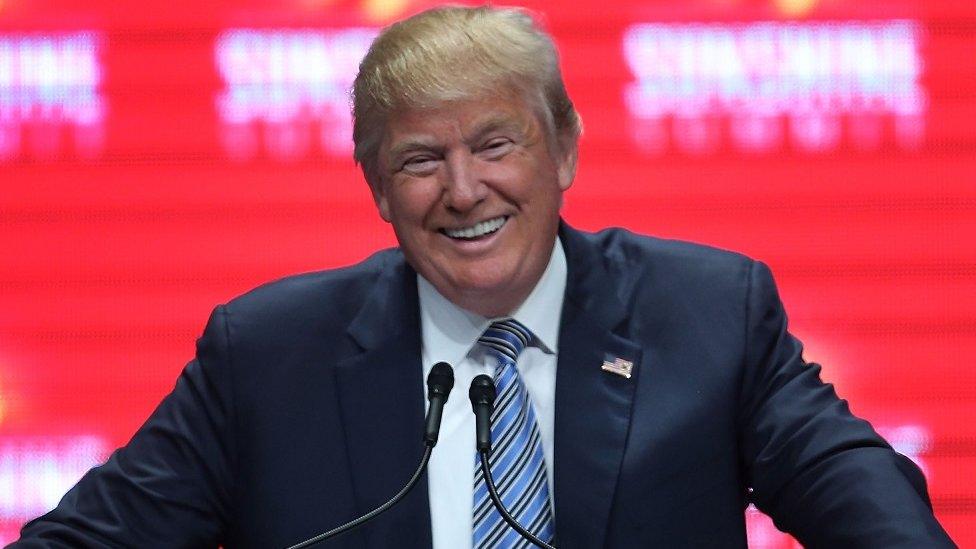
Donald Trump points out that he warned of the threat of Syrian refugees before the Paris attacks
The comments were derided at the time. Now, following the Paris attacks, such a view has become accepted wisdom among the Republican presidential candidates - and Mr Trump is once again taking credit.
Mr Cruz said the Obama administration's plans to resettle 10,000 Syrian refugees is "nothing short of lunacy".
"I recognise that Barack Obama does not wish to defend this country, that he may have been tired of war, but our enemies are not tired of killing us," he added.
Retired neurosurgeon Ben Carson, who places second behind Mr Trump in many polls, likened the threat, external of militants posing as refugees to having a "rabid dog" in the neighbourhood.
"You're probably going to put your children out of the way," he said. "It doesn't mean that you hate all dogs by any stretch of the imagination, but you're putting your intellect into motion."
Mr Carson said that it would be "almost malpractice" for IS not to try to infiltrate the refugees streaming into Western nations.
Even the candidates with more moderate positions on immigration have had to carefully modulate their statements to reflect the current sentiment among Republican voters.
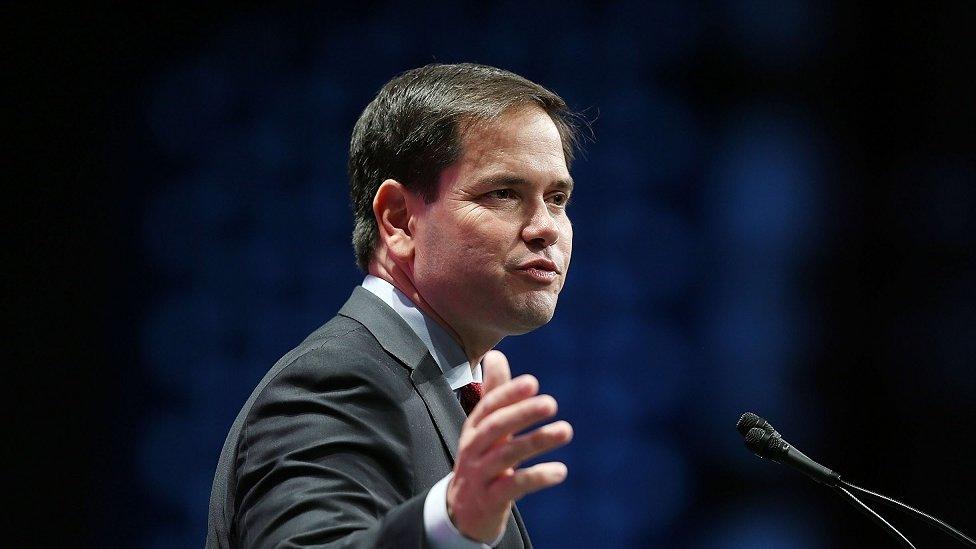
Marco Rubio echoes Mr Trump's concern, saying the US should shut down any place "radicals are inspired"
Many conservatives eye Marco Rubio suspiciously on the issue thanks to his leadership of the 2013 comprehensive reform effort in the US Senate, for instance. In September he said, external he would be "potentially open to the relocation" of some refugees.
On Sunday, however, he had changed his tune. "We won't be able to take more refugees" because of security concerns, he said.
"It's not that we don't want to," he told an ABC interviewer. "It's that we can't."
South Carolina Senator Lindsey Graham had been an early supporter of accepting Syrian refugees. Now, however, he's calling for a "timeout" until the the possibility of IS infiltration is addressed.
If the goal of Mr Trump's fellow Republican candidates was to prevent any daylight from appearing between their stance on Syrian refugees and that of the man they're chasing in the polls, however, it was mission unaccomplished.
By Thursday the New York billionaire was telling, external reporters that as president he would consider creating a government database to track Muslims in the US and closing down mosques "where bad things are happening".
"I think that now everybody is feeling that security is going to rule," Trump told Yahoo News. "And certain things will be done that we never thought would happen in this country in terms of information and learning about the enemy. And so we're going to have to do certain things that were frankly unthinkable a year ago."
Will this become the new normal for the Republican campaign as well? Perhaps.
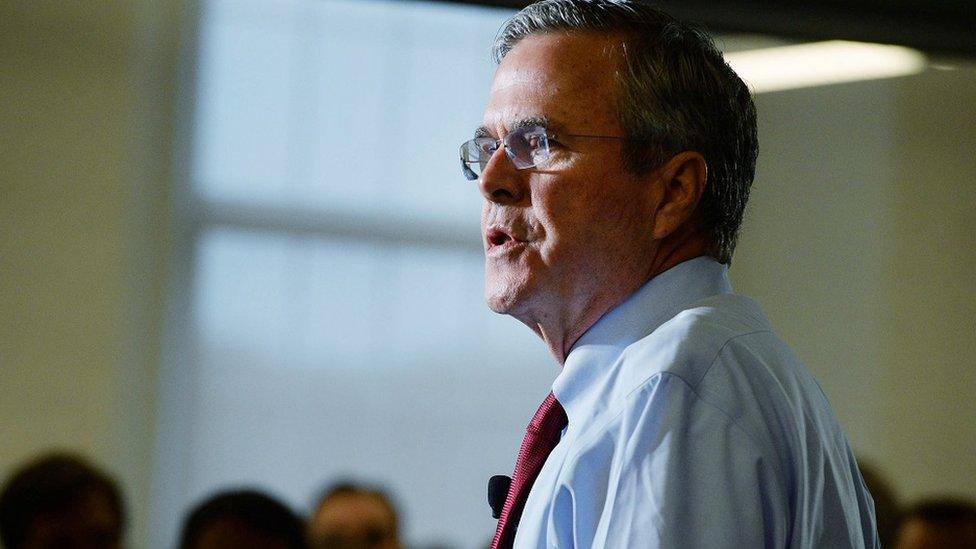
Jeb Bush says Mr Trump's latest rhetoric is "manipulating people's angst and their fears"
"It's not about closing down mosques," Mr Rubio told, external Fox News. "It's about closing down any place - whether it's a cafe, a diner, an internet site - any place where radicals are being inspired."
For the moment, former Florida Governor Jeb Bush isn't willing to cross that line.
"You talk about closing mosques, you talk about registering people, that's just wrong," he said, external on CNBC. "It's manipulating people's angst and their fears. That's not strength. That's weakness."
Last week the Washington Post's Philip Rucker and Robert Costa reported, external that Republican elites were growing increasingly anxious "bordering on panic" that an outsider like Mr Trump could seriously challenge for their party's nomination.
"We're potentially careening down this road of nominating somebody who frankly isn't fit to be president in terms of the basic ability and temperament to do the job," an unnamed strategist told the paper.
That was before the Paris attacks and the resulting immigration furore that has made nearly every Republican candidate sound more like the Donald Trump of just a month ago.
The real-estate mogul will surely face a coming onslaught from competitors and establishment interest groups to take him down before voting begins in February. Already a group affiliated with the Kasich campaign has announced, external a $2.5m (£1.65m) negative advertising campaign in New Hampshire questioning Mr Trump's capacity to serve as US commander-in-chief.
The fusillade may take its toll on the front-runner, leading to his eventual defeat. When it comes to setting the terms of the debate on immigration, border security and the fate of Syrian refugees, however, Mr Trump has already won.
Republican candidates in - and out - of the 2016 presidential race

- Published17 November 2015
- Published16 November 2015
- Published1 October 2015